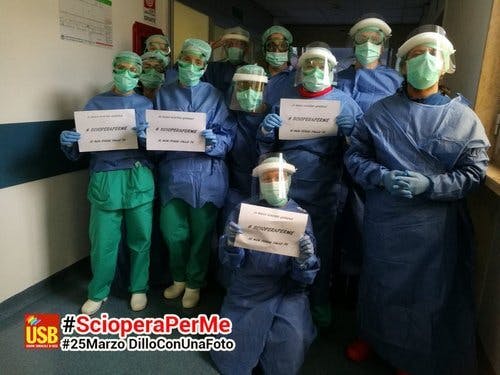Italian workers strike to force action on the coronavirus pandemic

Italian workers have gone on strike to shut down the country as the death toll from the COVID-19 pandemic surpasses 7,500 – mostly in Lombardy, the main industrial region in the north-west of the country. Despite the government’s well-publicised lockdown, it has been business as usual for many sectors of the economy.
Last week, the crisis triggered strikes across Italy, with workers demanding shutdowns and safety measures to stop the spread of the virus. “Workers at the shipbuilder Fincantieri in Liguria, where a worker tested positive for coronavirus, declared a strike on Thursday [19 March], which is ongoing and has spread to other company dockyards in the peninsula”, Politico’s Paola Tamma wrote on Friday. “Workers at Ilva, a steelworks in the southern region of Puglia, declared a 10-day strike due to lack of protective equipment.”
Pressure from the strikes forced the government into negotiations. It signed a safety protocol, but prime minister Giuseppe Conte remained adamant that “Italy does not stop”. On the weekend, he signed a decree ordering all non-essential businesses to close until 3 April. But some 80 industries and an estimated 12 million workers were designated essential.
In Lombardy, metalworkers’ unions protested that the list of “essential” industries and workers had been “excessively extended, covering areas of dubious importance”. They declared a one-day strike for yesterday (Wednesday 25 March). Chemical workers followed soon after. “The decree allows a lot of firms to remain open, many without the proper guarantees and safety norms, creating conditions not agreed with us and fanning a lot of concern among workers”, Paolo Pirani, national head of the Uiltec chemical and textile workers’ union, told a press conference.
The grassroots union Unione Sindacale di Base (USB), which has several hundred thousand members, also held a general strike throughout Italy to push for all non-essential industries to close. The USB says that Conte is in the pocket of employer group Confindustria, the General Confederation of Italian Industry. Workers in the health care industry also participated via video messages and photos.
The USB is more militant than the mainstream union federations – the CGIL (Italian General Confederation of Labour), CISL (Italian Confederation of Trade Unions) and UIL (Italian Labour Union). Its members are mainly in logistics and on farms. Below is a translation of the USB’s statement, published during Wednesday’s strike.
**********
General strike to stop non-essential production a great success. Excellent participation among health care workers in a symbolic stoppage
Halfway through the day, we can report extraordinary participation in the general strike called by the USB to demand that all non-essential production is shut down to restrict the spread of the coronavirus contagion between workers not only forced to get around on crowded transport – in clear contradiction of the government’s decrees – but also to carry out their work in totally unsafe conditions.
From north to south, from Trieste to Taranto, there are empty logistics warehouses and strikes in factories, even involving 70 percent of the workforce.
The participation of essential services workers in a symbolic one-minute strike was also exceptional. Entire brigades of firefighters took part, as did nurses, doctors, health care workers and auxiliary personnel in the national hospital network.
It is precisely these health care personnel, often precarious workers, who show the very strong support of those who aren’t able to participate, but nonetheless want to be present virtually in the day of struggle, including in memory of Daniela, the intensive care nurse at San Gerardo Hospital in the city of Monza who committed suicide, and all of the other victims Covid-19 has claimed among health care workers. The many moving videos and photos published here demonstrate this.
This 25 March is definitely an exciting panorama, despite the menacing lists of the Strike Commission [which designates which industries are “essential” and prohibited from striking] and the media blackout. Traffic police, researchers and administrators from the National Institute of Health (Istituto superiore di sanità), nurses from the Workers’ Compensation Agency (INAIL), staff from social security institutions, ministries, local administrations and tax authorities have “folded their arms”, even from home, interrupting smart working. Meanwhile, in educational institutions across Italy, the refusal of ATA [administrative, technical and ancillary] personnel to go to schools has been compounded by the suspension of distance education, which isn’t education.
All of this takes place while the secretaries of the CGIL, CISL and UIL – who have now secured a dog’s kennel in the [governmental] palace – roughly patch up an unacceptable decree [on essential services] to try to contain the overwhelming rage emerging in their own rank and file.
Today’s extraordinary mobilisation came about not thanks to the complicit unions, but the great, unprecedented mass movement which – even in impossible conditions – knew how to make its voice heard and to force the bosses, the government and their union allies into more and more ridiculous back downs every day. The slogan is and remains: Health First! Shut Everything!
----------
Translated by Alexis Vassiley. Edited for length.